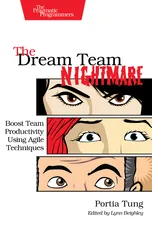The Dream Team Nightmare by Portia Tung
Imagine for a moment, you are writing a book about agile techniques and how they can be applied in the context of coaching a software team.

You might structure it in a nice, linear fashion, explaining the history of agile, enumerating each technique in turn and explaining when and how it could be used.
You might be tempted to invent a fictional company to illustrate points and to smuggle in some of your real-world experience without upsetting your past customers.
You probably won't put in enough examples and the ones you do have will have little depth.
What you almost certainly wouldn't do is disguise it as a "choose your own adventure" book. That would be silly. Which is why Portia Tung's approach in The Dream Team Nightmare is such genius.
Instead of wandering around dark corridors picking doors at random, finding treasure and killing monsters; Portia has created a world where you are an agile coach brought into a company to help their development teams work through problems with agile adoption, process, individuals and communication with the larger organisation.
Each chapter builds the story, demonstrates one or more techniques in that context, and presents a choice at the end. Your job is to decide what to do next and jump to the corresponding chapter. There are no, "Sorry, you were just eaten by a Grue" surprise consequences to wrong decisions, but as in real life, an accumulation of "wrong" answers leads to you leaving the adventure early. The book is structured so that you can retrace your steps to find where you went wrong and learn what was the right decision to make.
What I remember about the choose-your-own-adventure books (and similar computer games) was as fun as they were were, you never really learned anything more than the depth (or shallowness) of their creators creativity and sense of "humour". With Portia's book you will find a lot of techniques that are modelled well in the narrative, plenty of starting material for you to take and research independently and you will almost certainly learn something even if you aren't trying!
The book is very quick to read all the way through and is a lot of fun. I learned more than I thought I would but the downside of this book is that there really aren't any others like it in the field. It seems even more of a chore to go back to reading real books.
Full Disclosure
@PortiaTung and I are twitter "friends" and I helped debug an early version of the pdf manuscript.